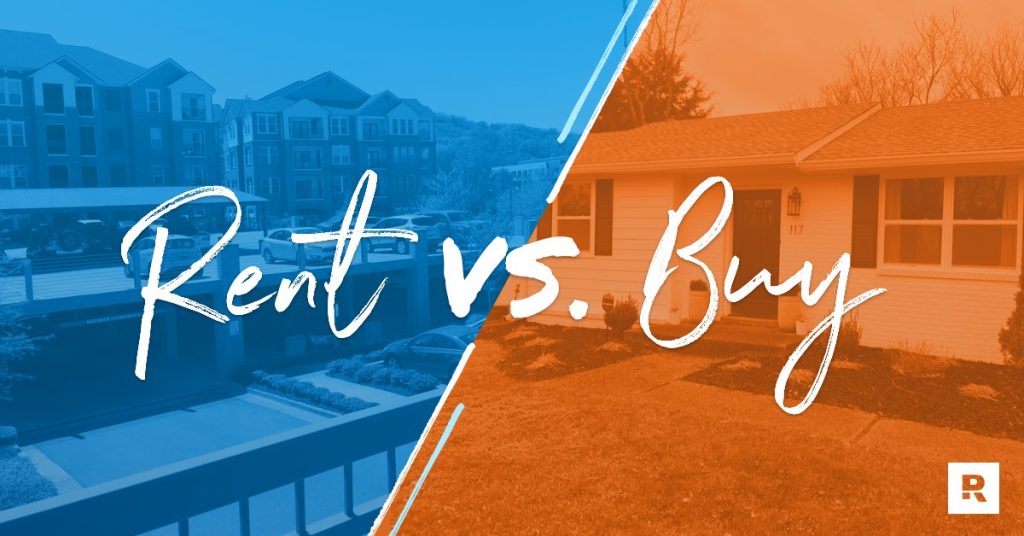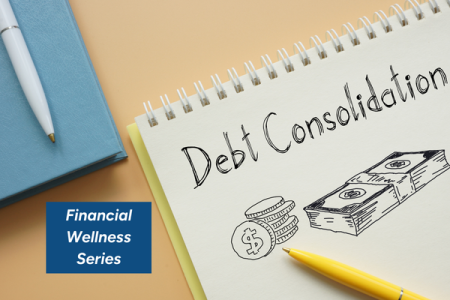Renting versus buying is a big decision. It’s right up there with, Should I eat a taco or a burrito? Well, not really. Your decision about where to live is way more permanent than your Chipotle order—plus it has a few more zeroes in the price.
But whether you should buy or rent a house really depends on your financial situation and personal goals—nothing else.
You’re ready to buy a house when you’re debt-free, have a full emergency fund plus enough cash for a down payment, and your mortgage payment won’t cost more than 25% of your take-home pay. We’ll talk more about that a little later.
If you’re paying off debt or expect to move for a job, it’s smarter to rent because renting gives you more flexibility. You may have heard the myth that renting is a waste of money. That’s not true. Housing is an essential expense. But buying lottery tickets? That’s tossing money straight out the window.
But making a wise choice about where you live is one of the best ways to take control of your finances!
Is It Better to Rent or Buy?
The rent-versus-buy debate is nothing new—but it seems to be the question on everyone’s mind lately because the housing marketing has been so crazy the past few years. Here’s the thing I want you to remember, though: Whether it’s better to rent or buy is up to you (as long as your finances are in order) because buying and renting both have pros and cons.
Buying a house gives you ownership, privacy and home equity, but the expensive repairs, taxes, interest and insurance can really get you.
Renting a home or apartment is lower maintenance and gives you more flexibility to move. But you may have to deal with rent increases, loud neighbors or a grumpy landlord.
There’s no doubt owning a home can be a source of pride and fun (who doesn’t want to put those Pinterest home décor boards to good use?), but it’s also a pricey source of stress! That’s why you want to be absolutely sure you’re ready to buy a house before you take this big step.
Pros and Cons of Buying and Renting
Now, these pros and cons don’t change the answer to the question, Should I buy or rent? They just help you prepare for the option that’s right for you. Let’s face it: Even if you’re financially ready to buy a home, you may not be thinking about repairs down the road. And that trendy apartment you love might come with some nosy neighbors.
So, let’s see what’s great (and not so great) about buying and renting.
Buying Pros
- You can actually own the house. When you pay rent, that money doesn’t build any equity. But when you pay your mortgage, your money goes toward owning your home. And once your house is paid off, it’s yours! You have the satisfaction of knowing you made the American dream your reality.
- You can cash in on appreciation. Your home will likely increase in value over time depending on the market and how well you take care of it. What you buy for $300,000 today could sell for $360,000 down the road.
- You have tax advantages. Many costs of owning a home—like property taxes and mortgage interest—are tax deductible.
- You have the freedom to renovate your house. As a homeowner, you can do whatever you’d like to your home. If you want to paint it hot pink from top to bottom, no landlord can stop you—although your spouse might have something to say about it.
- You have more privacy. Ricky and Lucy are arguing again—and because the apartment drywall is as thin as a playing card, every tenant can hear them. But having your own house means no Ricky, no Lucy and no flimsy apartment walls to deal with. Just you, peace and quiet (unless you’re watching a marathon of The Great British Baking Show). Of course, if your dream home is a condo in the middle of bright lights and city life, this wouldn’t apply.
Buying Cons
- It’s more difficult to travel and relocate. Want to go to Southeast Asia for six months on a whim? Leaving your house isn’t as easy as getting out of a lease, packing your bags, and getting a one-way ticket to who-knows-where. Same goes for work-related relocations. You’ll have to rent out or sell your house—or else prep it to stay vacant for a long time.
- You have more expenses. Remember how little renters insurance cost you? I hate to break it to you, but homeowners insurance will cost a lot more. Combine that with a possible flood policy, homeowners association (HOA) fees, property taxes and higher utility bills, and you’re looking at higher monthly expenses.
- You’re your own landlord. A leaky roof could be a full-on crisis that’ll take dipping into your emergency fund to fix (or replace with a whole new roof). But when you rent, a leaky roof just needs a bucket under the leak until your landlord fixes it.
- You have to save up money for a down payment and closing costs. This takes time and hard work. If you’re a first-time home buyer, I recommend putting down 5–10% of the home’s purchase price.
Renting Pros
- You can move easily. Tired of the city you live in? Thinking about taking a year to travel the world? When you rent, you don’t have to stay in the same location. Plus, it’s much easier to get out of a lease than a mortgage.
- You don’t have to pay for maintenance. If the stove goes kaput and the faucet pipes burst, you don’t have to call the plumber or make a trip to the appliance store. You call the landlord. One of the biggest perks of renting is that you never have to worry about surprise repair costs.
- It’s cheaper in the short term. Besides having virtually no maintenance costs in an apartment, renters insurance is way cheaper than insuring a home. Your move-in costs will also be lower since you pay a small security deposit instead of a giant down payment. Plus, once you’re in, you won’t pay high HOA fees or private mortgage insurance (PMI).
Renting Cons
- Rent rates will go up. Even if you found a killer deal in a hot area, inflation, competition and rising property values will cause your rent to go up year after year.
- You have no financial incentives. No tax deductions. No equity. No rising property value. So even though you’re spending your rent money on an important living expense, you might feel like you’re not making progress with your money.
- You don’t have freedom to renovate. New tile would look great in the bathroom, but your landlord may not approve, especially since they’ll pay for any renovations. You even have to ask for permission for simple changes, like paint colors.
![]()
Find expert agents to help you buy your home.
There you have it! Whether you’re ready to buy or want to keep renting, you’ve got a better idea of what you’ll be getting yourself into.
Is Renting Always Cheaper?
Renting an apartment is usually cheaper than buying a house. But renting a house instead of an apartment could cost more than the mortgage payment on that same house. Again, a lot of the price depends on location.
If you look at monthly costs alone though, homeownership usually tips the scale to the pricey side because you pay for maintenance, taxes and homeowners insurance on top of your mortgage.
Renting an apartment could be a more affordable option if you live in a market where houses are super expensive (looking at you, San Francisco).
But there’s a tipping point: If you rent for decades, you could end up paying more than if you’d bought a house in the first place. That’s because a house payment will stay the same while rents go up (unless you have an adjustable-rate mortgage, in which case your mortgage goes up too). So, if you’re going to stay put for the long haul, it’s better to buy—especially when you pay off your home.
Am I Ready to Buy a House?
Before you buy a home, you need to make sure your financial house is in order. That starts with getting out of debt. Next, save an emergency fund of 3–6 months of expenses, and after that, start saving for a down payment.
For first-time home buyers, I recommend at least a 5–10% down payment on a 15-year fixed-rate mortgage. (Stay far away from FHA and VA loans.) If you can save 20% for a down payment, you won’t have to pay private mortgage insurance (PMI)—which could save you a couple hundred bucks a month.
And when you’re deciding what you can spend on a house, make sure your mortgage payment (including principal, interest, property taxes, homeowners insurance, PMI and HOA fees) will be 25% or less of your take-home pay.
Things to Consider When Deciding Whether to Rent or Buy
Your financial situation is the most important thing to keep in mind when deciding to rent or buy. Because if you’re drowning in debt or don’t have a down payment saved, you’re not in a position to buy a house, bottom line.
But if your finances are in good shape, you still need to consider a few other things. Location is a big one! If you want to live in the city or part of town with good schools and crazy expensive homes, renting might be more affordable than buying. Or you could buy a house in a different part of town where prices are more affordable—but you’ll compromise on schools or your commute to work.
Here’s something else to think about: If you don’t see yourself living in the same city for a few years, don’t buy a home there. You usually want to stay in a house at least three years to avoid losing money when you sell it.
And once you buy a home, are you willing and able to maintain it? Mowing grass, cleaning gutters, replacing furnace filters—you’ll either need to do these things yourself or hire someone to do it for you (and that costs money). There’s always something to fix when you own a home!
Owning a home is great, but the repair and maintenance costs can really add up. So remember, the monthly rent or mortgage payment isn’t the only expense to consider.
How to Calculate the Cost of Renting vs. Buying a House
Before deciding whether to rent or buy, let’s look at how to crunch the numbers on both.
To figure out the cost of renting, search online for rentals in the neighborhood where you want to live. Rental listings should give you an idea of the cost of rent, plus utilities and other fees. Don’t overlook hidden fees! An apartment complex might tack on parking, elevator or garbage fees. And if you bring Rover along to your rental, you’ll usually have to pay a pet fee too.
To figure out the cost of a house, do an online search to get a ballpark price of houses you like and can afford. You can plug those prices and your down payment amount into our mortgage calculator to figure out your monthly payment—including principal and interest, taxes, homeowners insurance and HOA dues. This amount should be no more than 25% of your take-home pay. Expect to tack on about $300 a month for utilities like electricity, gas, water and sewer. Internet, streaming services and trash collection will add at least another $100.1
I ran some numbers through our mortgage calculator for a $300,000 home. With a 15-year mortgage (the only type of mortgage I recommend) at 6.25% interest with a 20% down payment, your total monthly payment should be about $2,550 (including taxes, insurance, and HOA dues). And with $400 for utilities and other services, you’re looking at about $3,000 a month. If that number gives you heartburn, you’ll need to look for a cheaper house or keep renting.
3 Reasons You Shouldn’t Buy a House
I talk to a lot of home buyers, and unfortunately, many of them regret their purchases because they bought for the wrong reason. I don’t want you to fall into the same trap as they did! So here are some reasons not to buy a house.
1. It’s a “great” deal.
You found the perfect house, and the sellers are practically giving it away. It just might be the deal of the century. Even though you’re still paying off your student loans, it’d be a dumb idea to walk away—right?
Wrong! When it comes to real estate, you’re way better off buying the right home at the right time—not buying a house based solely on the market. When you do that, you run the risk of getting in over your head with a house you can’t truly afford.
Have some patience. And remember, good deals are like buses: Another one will come along soon.
2. You feel pressured.
Many home buyers in their 20s and 30s feel a ton of pressure to buy a house because they think it’s the “grown-up” thing to do. The truth is, taking control of your money is the most grown-up thing you can do.
So, if you’re 25 and feel like you’re behind the curve because you haven’t bought a house yet, relax. Don’t rush into a big purchase just because your friends or family keep telling you that you should (remember, you don’t know their financial situation and you don’t want to take advice from broke people). Adults know homeownership isn’t always the smartest money decision in every situation.
It’s much wiser to wait to buy until you’re financially ready. And trust me, no one has ever regretted waiting until they were ready for anything—especially a house!
3. You plan to move in a couple of years.
If you’re not crazy about where you live, why would you buy a house there? And in the same vein, it doesn’t make sense to buy a house if you know you’re going to relocate for work or family reasons in the next year or two. Make sure you’re really ready to put down roots before you buy.
3 Times When You Should Rent
I want to repeat that renting is not a waste of money. Sure, you’re giving your money to the landlord. But you’re paying to live somewhere. And as long as you’re paying for a place to live, your money is well spent.
While I don’t recommend renting as a permanent way of life, there are a few times when it’s better to rent than buy.
1. You’re paying off debt.
If you have student loans, credit card bills or any other debt to stomp out, consider your apartment your stomping ground. You can hang out there with your cheap renters insurance and let the landlord pay for all the maintenance while you knock out that debt.
If your rent is eating up too much of your paycheck, find a cheaper apartment so you have a better opportunity to get out of debt and save.
2. Your job requires you to move around.
If you’re in the military or you don’t plan to stay long in an area, it’s smarter to rent. In most places, you’ll need to stay in a house for two to three years to make buying worth the up-front costs.
3. You need time to make a plan.
Buying a house is a long-term commitment. Like with any relationship, acting impulsively is never a smart move. So, if you just got married, graduated from college, or aren’t sure which neighborhood you want to live in, the smartest thing you can do is rent for a while. I recommend waiting at least a year—that gives you time to decide how close you want to be to the in-laws.
Read the full article here









